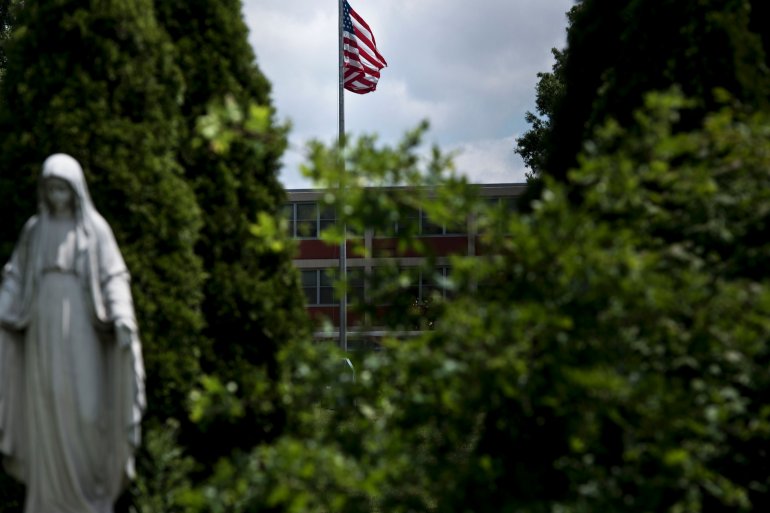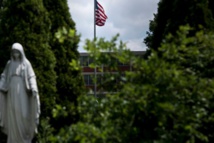The nun, a cheerful, buoyant woman known as Sister Cathy, was 26 when she died. She was a teacher at the all-girls' Archbishop Keough High School, and her students were crazy about her.
But there was apparently a dark side of the school, overseen by the Baltimore archdiocese. The school chaplain, Father Joseph Maskell, was allegedly a dangerous pedophile who exerted psychological domination over his victims.
Maskell, who was also a police chaplain, denied any wrongdoing. He died in 2001 and was never charged.
The makers of "The Keepers" follow the dogged work of two women in their 60s, Gemma Hoskins and Abbie Schaub, students of Sister Cathy (whose last name was Cesnki), who created a Facebook page to try to learn the truth about the death of their teacher.
The retired women effectively become detectives, digging back into decades' worth of files and creating an online posse of sleuths.
- Breaking the silence -
The pair uncover stunning information, which is revealed over the course of the series' seven episodes.
Dozens of former students at the high school came forward to break decades of silence and talk about how they were sexually abused by Father Maskell.
The hypothesis of the series is that Sister Cathy was killed by the priest as she was about to reveal his crimes.
The success of the series illustrates Americans' fascination with so-called cold cases -- unresolved cases that are technically open but all but dead.
Two similar documentaries have recently made real-life impacts. A man named Adnan Syed, convicted of killing his girlfriend, may get a new trial thanks to the hit podcast "Serial."
And a man imprisoned for life as a minor may be freed because of documentary TV series "Making a Murderer."
"The Keepers" is also stirring up pressure for justice.
"People are very angry. That's the emotion I am seeing most that comes out of it. People are frustrated," said Ryan White, the director of the series. "They want something to be done about it."
- The church strikes back -
Over the course of the work by White's team, which lasted three years, two major institutions in Baltimore -- a port city with many Catholics -- were heavily criticized for their handling of the case: the police and the Catholic Church.
They have now hit back.
Accused of ignoring Father Maskell's victims, the archbishop of Baltimore published online a series of questions about the case and the church's response to them. This approach, too, has been criticized.
"I am someone now who is very protective of Maskell's survivors, because I spent the last three years listening to them and I am indebted to them because their stories comprise 'The Keepers," said White.
"And to watch the Catholic Church come out in attack mode, questioning the integrity of them and the documentary, I call this sickening."
Church officials insist they did not learn of accusations against the priest until 1992 and accuse "The Keepers" of misrepresenting the role of the church in the case.
"At no point do we suggest that Maskell was not guilty, or that the victims aren't telling the truth. We believe that to be the case," said Sean Caine, a spokesman for the Baltimore archdiocese.
As soon as the allegations emerged, Caine said, "we hired a private investigator. We spent hundreds of hours investigating it, interviewing former students, former family numbers, people in the community. No success at all."
But he acknowledged the church could have done a better job at public relations given the raw emotions raised by the documentary.
Police have reopened the investigation, acutely aware that, with the series' popularity, they are being closely watched.
Maskell's remains were exhumed to see if his DNA could be linked to the killing of Sister Cathy.
The results turned up nothing. But the probe has taken on another, larger dimension.
"I think we can still find out the answer and I think Father Maskell engineered this murder," said White.
-----------------------------------------------------------------------------------------------------------------------
But there was apparently a dark side of the school, overseen by the Baltimore archdiocese. The school chaplain, Father Joseph Maskell, was allegedly a dangerous pedophile who exerted psychological domination over his victims.
Maskell, who was also a police chaplain, denied any wrongdoing. He died in 2001 and was never charged.
The makers of "The Keepers" follow the dogged work of two women in their 60s, Gemma Hoskins and Abbie Schaub, students of Sister Cathy (whose last name was Cesnki), who created a Facebook page to try to learn the truth about the death of their teacher.
The retired women effectively become detectives, digging back into decades' worth of files and creating an online posse of sleuths.
- Breaking the silence -
The pair uncover stunning information, which is revealed over the course of the series' seven episodes.
Dozens of former students at the high school came forward to break decades of silence and talk about how they were sexually abused by Father Maskell.
The hypothesis of the series is that Sister Cathy was killed by the priest as she was about to reveal his crimes.
The success of the series illustrates Americans' fascination with so-called cold cases -- unresolved cases that are technically open but all but dead.
Two similar documentaries have recently made real-life impacts. A man named Adnan Syed, convicted of killing his girlfriend, may get a new trial thanks to the hit podcast "Serial."
And a man imprisoned for life as a minor may be freed because of documentary TV series "Making a Murderer."
"The Keepers" is also stirring up pressure for justice.
"People are very angry. That's the emotion I am seeing most that comes out of it. People are frustrated," said Ryan White, the director of the series. "They want something to be done about it."
- The church strikes back -
Over the course of the work by White's team, which lasted three years, two major institutions in Baltimore -- a port city with many Catholics -- were heavily criticized for their handling of the case: the police and the Catholic Church.
They have now hit back.
Accused of ignoring Father Maskell's victims, the archbishop of Baltimore published online a series of questions about the case and the church's response to them. This approach, too, has been criticized.
"I am someone now who is very protective of Maskell's survivors, because I spent the last three years listening to them and I am indebted to them because their stories comprise 'The Keepers," said White.
"And to watch the Catholic Church come out in attack mode, questioning the integrity of them and the documentary, I call this sickening."
Church officials insist they did not learn of accusations against the priest until 1992 and accuse "The Keepers" of misrepresenting the role of the church in the case.
"At no point do we suggest that Maskell was not guilty, or that the victims aren't telling the truth. We believe that to be the case," said Sean Caine, a spokesman for the Baltimore archdiocese.
As soon as the allegations emerged, Caine said, "we hired a private investigator. We spent hundreds of hours investigating it, interviewing former students, former family numbers, people in the community. No success at all."
But he acknowledged the church could have done a better job at public relations given the raw emotions raised by the documentary.
Police have reopened the investigation, acutely aware that, with the series' popularity, they are being closely watched.
Maskell's remains were exhumed to see if his DNA could be linked to the killing of Sister Cathy.
The results turned up nothing. But the probe has taken on another, larger dimension.
"I think we can still find out the answer and I think Father Maskell engineered this murder," said White.
-----------------------------------------------------------------------------------------------------------------------









 Home
Home Politics
Politics











